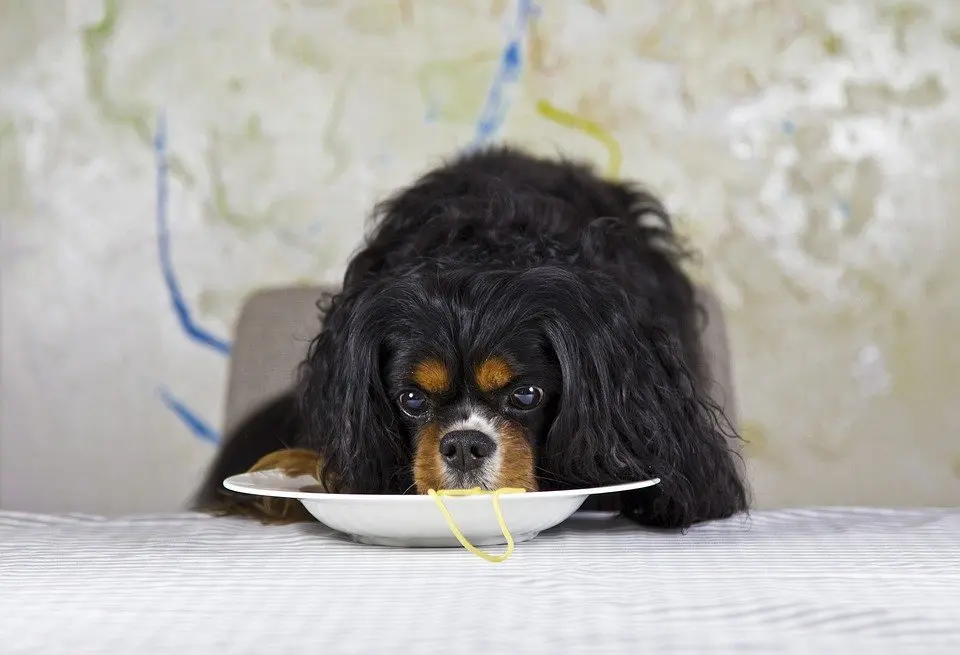Even though ripe tomatoes are generally safe for dogs to consume, spaghetti sauce is not. Spaghetti sauce – whether it’s marinara, vodka sauce, pizza sauce, or even Alfredo – contains spices that are toxic to dogs. If your dog just consumed a large amount of spaghetti sauce, keep reading to find out what you should do…

Remember that scene in Lady and the Tramp when the two dogs share a plate of spaghetti? Yeah, don’t try that in real life.
Why Spaghetti Sauce Is Bad for Dogs
Spaghetti sauces contain garlic and onion, both of which are toxic to dogs. The sauce may also contain other ingredients that are harmful to dogs, but garlic and onion are the main culprits.
Furthermore, unripe tomatoes, tomato stems, and tomato leaves contain a chemical called tomatine, which is also toxic to dogs, and may be present in some tomato sauces.
Lastly, tomato sauces and other types of pasta sauces typically contain a large amount of sodium. Consuming too much salt can cause your dog to become dehydrated, which can lead to them drinking too much water, causing bloat.
Bloat might not sound like a big deal, but it is potentially fatal. The dog’s stomach rapidly fills with gas, which can cause it to twist on itself.
Signs and Symptoms
The first thing you need to do is observe your dog closely for negative symptoms. Primarily, you are looking for the symptoms of garlic/onion toxicity, which include:
- Lethargy
- Rapid heart rate
- Rapid breathing
- Pale gums and mucus
- Dehydration
- Vomiting
- Diarrhea
Note: If your dog vomits immediately after eating spaghetti, and you can see they’ve expelled the undigested sauce, they are going to be just fine.
Take Your Dog to a Vet or Emergency Animal Clinic
If your dog is clearly exhibiting the symptoms above, and they appear to be worsening, you should take them to a vet right away. However, do not panic. It is extremely rare for a dog to die from consuming spaghetti sauce, even if they have consumed a large amount, and are experiencing toxicity.
Even though there is no cure for garlic toxicity, if you get them to the animal hospital fast enough, the vet can safely make them vomit, which should prevent further discomfort. The vet may also be able to give them something to ease whatever discomfort they may be experiencing.
Dogs That Are Most Susceptible to Toxicity
Japanese breeds, such as Akitas and Shiba Inus, are the most susceptible to garlic toxicity. Also, dogs on medications might be more at risk.
Size Matters
The size of your dog matters a lot in this scenario. For example, your dog would likely have to consume several cloves of garlic per pound of bodyweight to do any serious damage to them self.
So, if your 60 lb Labrador ate your plate of spaghetti while you stepped away from the table, they might get an upset stomach, but that’s about it. On the other hand, if your 6 lb Chihuahua jumped on the table, and ate the same amount, they could get seriously ill.
Frequency Also Matters
Most dogs are going to eat something that’s bad for them at some point in their life, whether it’s spaghetti sauce or your leftover McDonald’s that you forgot to put out of their reach; and most of the time, they’re going to be fine. So, if one time your dog gets their snout into a pot of spaghetti sauce, and licks it clean, I wouldn’t worry too much about it.
However, if your dog regularly consumes foods that contain garlic and onions, it could have an accumulative effect that could lead to serious health problems down the road, such as anemia. In that respect, for most dogs, it is the frequency of consumption that is more dangerous than the quantity. In other words, don’t let your dog make a regular habit of licking your pasta plate clean.
Plain Spaghetti Is Fine
If your dog ate some pasta noodles without sauce on them, you have nothing to worry about. Pasta is just water and flour. Wheat flour is commonly used in dog food and biscuits. It won’t hurt them. In fact, if you want to give your dog some plain spaghetti noodles as a treat, go right ahead.
References:
Natália Kovalkovičová, Irena Šutiaková, Juraj Pistl, and Václav Šutiak (September 28, 2009). Some foods toxic for pets. Retrieved from https://www.ncbi.nlm.nih.gov/pmc/articles/PMC2984110/
- How to Groom a Shiloh Shepherd - October 26, 2023
- Should You Get a Shiloh Shepherd? Here’s Everything You Need to Know… - October 26, 2023
- How to Train Your Samoyed to Stop Barking so Much - October 25, 2023

